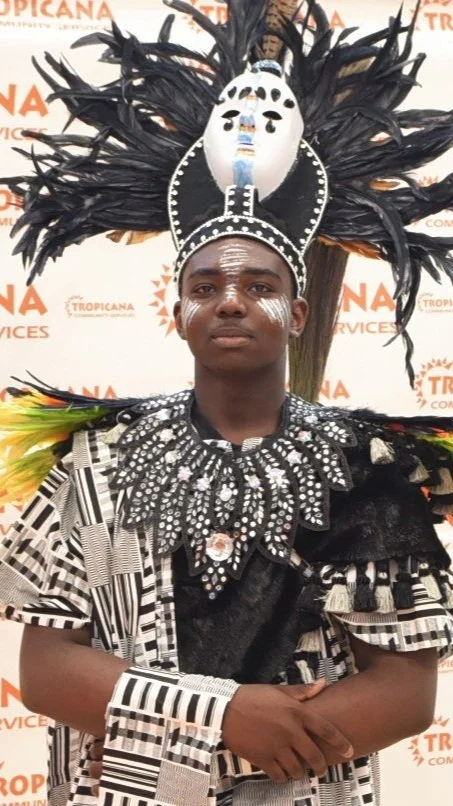Dahlia Bateman enjoying new role as Laurier University General Counsel
August 4, 2022
As a young girl growing up in rural Jamaica, Dahlia Bateman was quite inquisitive.
“I would question why things are the way they are and people’s differences and how they resolved them,” she recounted. “I was curious about political and foreign affairs and listened to the BBC (British Broadcasting Service) on our radio.”
Though the last of seven children, Bateman didn’t take a back seat to her older siblings.
“I like them very much, but there was no way I was going to allow them to get the better of me in anything,” she said. “I argued every point and I liked debating because I wanted to win. I did not allow my little voice to be silenced.”
As a movie lover, Bateman enjoyed watching legal films. Her favourite is the 1957 drama, ‘Witness for the Prosecution’.
Set in Old Bailey in London, the picture is based on the 1953 play of the same name telling the story of a murder accused trial.
Possessing an analytical mind combined with sound speaking and listening skills, it is not surprising that Bateman gravitated to law as a career.
Seeking a change after almost 11 years as the main lawyer for a national restaurant and hospitality group of companies, a post for General Counsel and Lead in Wilfrid Laurier University Office of Legal Services & Fair Practices intrigued her.
Bateman applied and was successful.
At the end of last May, she assumed the new role confident she can help the university achieve its institutional goals and uphold its tradition of excellence.
Just the second Canadian university to qualify for the prestigious ‘Changemaker Campus’ designation, Laurier is a recognized global leader in social entrepreneurship and social innovation education.
Bateman will provide strategic legal advice and advocacy across various sectors, including technology, broadcasting, music and hospitality.
She manages a staff of three lawyers.
“As the person in charge of the university’s legal matters, I will also negotiate contracts on behalf of the institution, work with outside counsel and lead the Office of Fair Practices that deals with human rights, equity and diversity issues,” the new hire said. “My role has to do with anything that is in the purview of protecting the university’s legal interests.”
While the United States is the first destination of choice for Caribbean students seeking to pursue higher education overseas, Bateman was fixated on Canada after an older brother visited Saskatchewan while enrolled at Knox College.
One of the many photos he took during his short visit in the 1970s resonated with her.
“He was sitting in an area with a bunch of people, some of whom were wearing dashikis,” recounted Bateman who, in 2018, was inducted into the Dalhousie University Schulich School of Law Bertha Wilson Honour Society. “It looked like they were international students and they were having fun. I told myself I wanted to go that country to live even though my siblings were planning to go to university in the U.S.”
After completing her secondary school education at Manchester High and The Liguanea, she joined the banking sector before coming to Toronto in 1988 for vacation.
On her return to Jamaica, Bateman worked part-time at the Canadian High Commission in Kingston and with the European Economic Commission to save money to attend school in Canada.
Back in Toronto in 1992, she held a few casual jobs before pursuing labour management relations studies two years later at the University of Toronto (U of T).
Caribbean Studies was her minor.
Bateman completed a Master in Information Studies at U of T prior to taking up then Caribbean Studies professor Dr. Bernard Delpeche’s suggestion to attend law school at Dalhousie University in Nova Scotia.
“My research indicated it was a national law school and I applied in February 2001 and got through,” she said.
In the first semester in law school, Bateman was paired with corporate lawyer Roberta Clarke as part of The Legal Legacies and Bridges Mentorship program.
That experience paid handsome dividends.
“Roberta is an amazing and phenomenal leader and a well-respected lawyer in Nova Scotia,” she said. “I got the opportunity to go to her law firm and experience some of the inner workings of the legal profession. I was new to the profession and in a province that was new to me, so I jumped on the program when I learnt of it. I could not have asked for a better match. She brought me into her circle and her world. That experience helped allay some of my fears going into a profession that can be intimidating at times.”
Dahlia Bateman (r) and Roberta Clarke (Photo by Ted Power/Nova Scotia Bar Society)
Graduating with a law degree in 2004, Bateman articled for a year with a corporate commercial law firm in Halifax before returning to the Greater Toronto Area and launching her own law firm.
She shared office space with Aston Hall who is Ontario’s first Black Associate Chief Justice.
“Though I did not have the support system of a ‘law firm of which I was a part’, I was in an environment of lawyers that were fantastic mentors and did very well in their fields, mainly criminal law,” noted this year’s Lexpert Rising Stars Awards judge. “It felt like a thriving and winning atmosphere.”
Just months into her practice, Bateman won a major decision in the Ontario Superior Court of Justice involving a patient’s right to refuse medication.
The landmark ruling has been cited in several cases.
“One of my colleagues, who was an established lawyer, got the case but it wasn’t his area of expertise,” the Canadian Corporate Counsel Association Ontario chapter Chair pointed out. “Always a mental health advocate, I agreed to take on the challenge. I attended a few hearings before the Consent and Capacity Board where my client was unsuccessful in being relieved from an institution.”
At the judicial review in Superior Court, Bateman’s arguments led to her client’s release.
“It was a very difficult case and still is today one of the most difficult I have ever done because not only was I navigating an area of law that I wasn’t familiar with and also trying to convince a tribunal that my client is entitled to her constitutional right to be released and not to take medication,” the former Dalhousie University Ombudsman said.
“I also had to navigate dealing with the family of that client who is saying, ‘No, she should be where she is in hospital because she needs help’. That’s not how the law works. It is not parens patriae (the need to act for the protection of those who cannot care for themselves). It is about understanding the medication and the effect of not taking it. It is a fundamental right for the patient to choose what he or she puts in their body and the repercussions of not taking it. As long as that person doesn’t pose a threat to themselves or to others, then there is no good reason to keep that person in an institution against their will. In some regard, it was a victory for the de-stigmatization of mental health.”
To maintain her work-life balance, Bateman is very involved in sports and volunteering.
She coaches in a soccer House League in Burlington, loves playing golf and tennis and enjoys attending international track and field meets around the world.
Dahlia Bateman is a very active and engaged volunteer (Photo contributed)
Bateman sponsors school programs for young people in Jamaica and is a volunteer advisor for the Canadian Executive Services Organization that provides humanitarian assistance and professional advice to organizations in 120 countries.
Previously, the married mother of two children served on several boards, including St. Leonard’s Place that is a transitional home for formerly incarcerated men and the A-Supreme Foundation that supports vulnerable seniors.
Bateman currently sits on the Toronto Kiwanis Festival Board and the Toronto District School Board Black Students Advisory Committee and was one of the architects of the Board’s first anti-Black racism policy.








